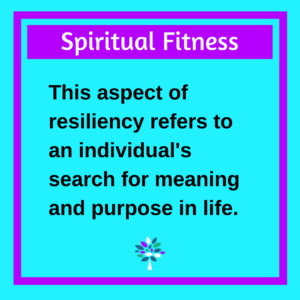Spiritual Fitness

In this final post on resiliency we are looking at the aspect of spiritual fitness.
For the purposes of this post, we are defining spirituality in it’s broadest sense, as connecting to something greater than yourself. This does not necessarily mean religion, although for some it may.
An important aspect of spiritual fitness is developing positive spiritual ways of coping. These include developing and maintaining a positive relationship with your higher power, using your spiritual or religious social network as a resource and viewing your place of worship as a safe haven. People who in engage in positive spiritual coping have lower rates of stress, depression and anxiety and increased levels of life satisfaction and physical and mental well-being.
It is important to remember that you can also make your situation worse or more upsetting by using negative religious or spiritual ways of coping. These include a focus on themes of punishment and guilt, abdicating responsibility and action to your higher power. If you are part of a religious or spiritual community that makes you feel worse about yourself it may be time to look at whether this community is right for you. It is about leaving communities in which it feels like an abusive relationship.
Connecting to your faith or spirituality can help rekindle your sense of hope in yourself, others and the future. Your faith can remind you that there is something bigger than you, something more for you to do in life.
Spiritual fitness is about making time for obtaining inspiration, guidance and comfort from prayer, meditation, reading of sacred texts, meditation, devotional activities.
Spiritual fitness is about developing a practice of forgiveness. This is about learning to forgive yourself, and as appropriate, to forgive others. Forgiveness can help release you from being dominated by feelings of anger, hostility guilt, shame or a desire for revenge. Forgiveness is a deliberate practice and takes time. It is not about condoning past bad behavior or allowing unhealthy people back into your life. It is about letting go of the pain that is keeping you stuck.
Much of the above information is taken from Dr. Donald Meichenbaum’s book Roadmap to Resilience: A guide for military, trauma victims and their families.










